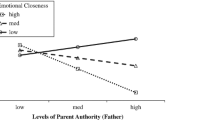Abstract
On a sample of 313 nine- through 16-year-old Spanish children this study explored the question: Is the relation between paternal versus maternal acceptance and the psychological adjustment of offspring significantly affected by the level of interpersonal power and/or prestige of each parent within the family? The relationship between perceived parental acceptance and children’s psychological adjustment depends on which parent was perceived by children to have higher interpersonal power or prestige than the other. This trend was especially strong in families when mothers were perceived to have both higher power and higher prestige than fathers. The strongest overall contribution to children’s adjustment, however, was made in families where fathers were perceived to have both the highest power and the highest prestige.
Similar content being viewed by others
References
Berger, J., & Webster, M, Jr. (2006). Expectations, status, and behavior. In P. J. Burke (Ed.), Contemporary social psychological theories (pp. 268–300). Stanford, CA: Stanford University Press.
Bruins, T. (1999). Social power and influence tactics: A theoretical introduction. Journal of Social Issues, 55, 7–14.
Chyung, Y-J. (2010). International father acceptance-rejection project report from Korea. Unpublished manuscript.
Dornbusch, S. M., Zelditch, M., Berger, J., Cohen, A. H., & Scott, W. (1962). A proposal for the study of authority structures and evaluations. Unpublished manuscript, Stanford University, Palo Alto, California.
Gehring, T., Wentzel, K., Feldman, S., & Munson, J. (1990). Conflict in families of adolescents: The impact on cohesion and power structures. Journal of Family Psychology, 3, 290–309.
Glavak-Tkalić, R. (2010, July). Relations between fathers’ power, prestige, acceptance, and involvement and psychological adjustment among Croatian adolescents. Paper presented at the meeting of the international society for interpersonal acceptance and rejection, Padua, Italy.
Homans, G. (1961). Social behavior: Its elementary forms. New York: Harcourt, Brace and World, Inc.
Huo, Y. J., & Binning, K. R. (2008). Why the psychological experience of respect matters in group life: An integrative account. Social Psychology and Personality Compass, 2, 1570–1585.
Huo, Y. J., Binning, K. R., & Molina, L. (2010). Testing an integrative model of respect: Implications for social engagement and well-being. Personality and Social Psychology Bulletin, 36, 200–212.
Keltner, D., Gruenfeld, D. H., & Anderson, C. (2003). Power, approach, and inhibition. Psychological Review, 110, 265–284.
Khaleque, A., & Rohner, R. P. (2002). Perceived parental acceptance-rejection and psychological adjustment: A meta-analysis of cross-cultural and intracultural studies. Journal of Marriage and the Family, 64, 54–64.
Khaleque, A., & Rohner, R. P. (2011). Pancultural associations between perceived parental acceptance and psychological adjustment of children and adults: A meta-analytic review of worldwide research. Journal of Cross-Cultural Psychology, Advance online publication. doi: 10.1177/0022022111406120.
Khaleque, A., Rohner, R. P., & Shirin, A. (2010, July). Impact of fathers’ power, prestige, and love in Bangladeshi families. Paper presented at the meeting of the international society for interpersonal acceptance and rejection, Padua, Italy.
Lloyd, J., & Moore, K. (2011). Analysis of the parental power-prestige questionnaire (3PQ) and its association with the two-item measure of parental power and prestige. Unpublished manuscript, University of Chester, Chester, U.K.
Minuchin, P. (1985). Families and individual development: Provocations from the field of family therapy. Child Development, 56, 289–302.
Rohner, R. P. (1986). The warmth dimension: Foundations of parental acceptance-rejection theory. Beverly Hills, CA: Sage Publications.
Rohner, R. P. (2004). The parental “acceptance-rejection syndrome”: Universal correlates of perceived rejection. American Psychologist, 59, 827–840.
Rohner, R. P. (2005). Parental acceptance-rejection questionnaire (PARQ): Test manual. In R. P. Rohner & A. Khaleque (Eds.), Handbook for the study of parental acceptance and rejection (4th ed., pp. 43–106). Storrs, CT: Rohner Research Publications.
Rohner, R. P. (2008). Index of parental power and prestige. Unpublished manuscript. University of Connecticut, Storrs.
Rohner, R. P. (2011). The parental power and prestige questionnaire (3PQ). Storrs, CT: Rohner Research Publications.
Rohner, R. P., & Britner, P. A. (2002). Worldwide mental health correlates of parental acceptance-rejection: Review of cross-cultural and intracultural evidence. Cross-Cultural Research, 36, 16–47.
Rohner, R. P., & Khaleque, A. (2005). Personality assessment questionnaire (PAQ): Test manual. In R. P. Rohner & A. Khaleque (Eds.), Handbook for the study of parental acceptance and rejection (4th ed., pp. 187–226). Storrs, CT: Rohner Research Publications.
Rohner, R. P., & Khaleque, A. (2010). Testing central postulates of parental acceptance-rejection theory (PARTheory): A meta-analysis of cross-cultural studies. Journal of Family Theory and Review, 3, 73–87.
Rohner, R. P., & Veneziano, R. A. (2001). The importance of father love: History and contemporary evidence. Review of General Psychology, 5, 382–405.
Silverstein, L. B., & Phares, V. (1996). Expanding the mother-child paradigm: An examination of dissertation research, 1986–1996. Psychology of Women Quarterly, 20, 39–53.
Weber, M. (1947). The theory of social and economic organization. (Trans: Henderson, A. M., & Parsons, T.). New York: The Free Press.
Wentzel, K. R., & Feldman, S. S. (1996). Relations of cohesion and power in family dyads to social and emotional adjustment during early adolescence. Journal of Research on Adolescence, 6, 225–244.
Author information
Authors and Affiliations
Corresponding author
Rights and permissions
About this article
Cite this article
Carrasco, M.A., Rohner, R.P. Parental Acceptance and Children’s Psychological Adjustment in the Context of Power and Prestige. J Child Fam Stud 22, 1130–1137 (2013). https://doi.org/10.1007/s10826-012-9675-0
Published:
Issue Date:
DOI: https://doi.org/10.1007/s10826-012-9675-0



